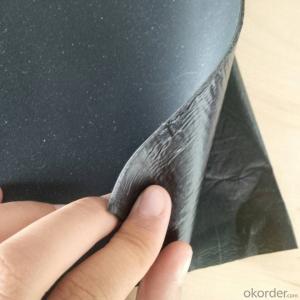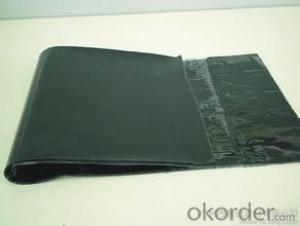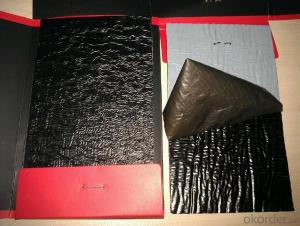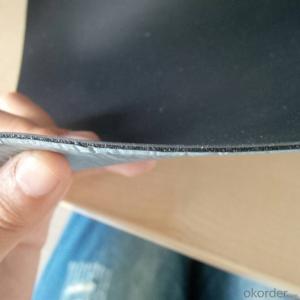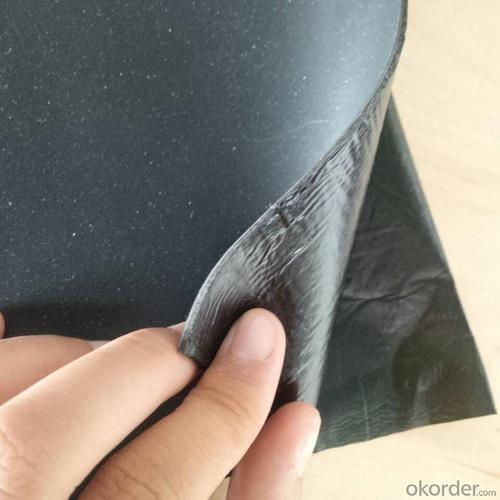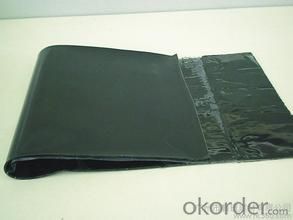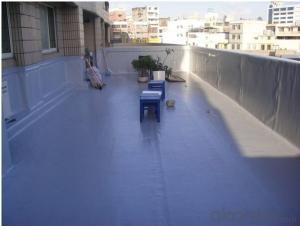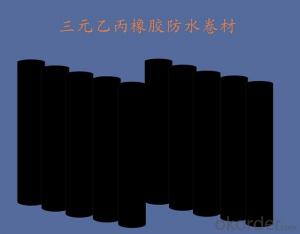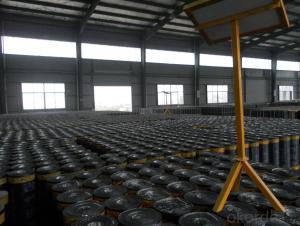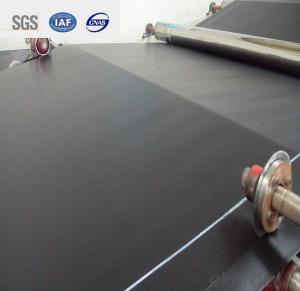Self adhensive Modified Waterproof Membrance for Roof
- Loading Port:
- Tianjin
- Payment Terms:
- TT or LC
- Min Order Qty:
- 5000 m²
- Supply Capability:
- 15000000 m²/month
OKorder Service Pledge
OKorder Financial Service
You Might Also Like
Quick Details
Type: | Waterproof Membrane | Place of Origin: | Shandong, China (Mainland) | Brand Name: | CMAX |
Model Number: | Excaid-D | thickness:1.2mm,1.5mm,2.0mm: | Raw mateiral:EPDM rubber | width:1200mm: | Standard:GB18173.1--2006 |
length:20m: | Tear strength:>=25KN/m | break tensile strength >=7.5MPa: | waterproof:0.3MPa,30min | break elongation:>=450%: | usage:building waterproof |
Packaging & Delivery
Packaging Details: | PE membrane and pallet |
Delivery Detail: | within 20 days after receiving downpayment |
Specifications
1.ISO9001,ISO14001
2.Top 3 of Chinese waterproof materials manufacturer
3.Customize product property
4.System accessories
Technical Specification:
Type | Waterproof Membrane | |||
Material | EPDM RUBBER | |||
Thickness | 1.2mm; 1.5mm;2.0mm | |||
Weight(kg/m2) | 1.2mm | 1.5mm | 2.0mm | |
1.54-1.58 | 1.79-1.83 | 2.25-2.29 | ||
Length | 20m/Roll | |||
Width | 1.2m | |||
Usage | basements, ponds, Lake, steel structure roofing, underground, tunnels etc. | |||
Packing | 24 sqm/ROLL | |||
Loading in Container | ROLLS | |||
Colors | customized | |||
Enclosure | ||||
Technical Data:
Tensile Strength N/CM | Normal temperature: ≥60 ; 60°C: ≥30 |
Breaking Elongation % | Normal temperature:≥400 ; -20°C: ≥10 |
Tear Resistance N | ≥20 |
Impermeability, 30 min no leakage | 0.3Mpa |
Low Temperature Bending °C | ≥ -20 |
Heating Shrinking mm | Extension: ≥2 Shrink:≥4 |
Heat Resistance (80°C×168h) | Tensile Strength % : ≥80 ; Keeping rate of adhesive breaking:≥70 |
Alkali resistance (10% ca (oh)2 solution,normal temperature ×168h)) | Tensile Strength % : ≥80 ; Keeping rate of adhesive breaking:≥80 |
Synthetic aging | Tensile Strength % : ≥80 ; Keeping rate of adhesive breaking:≥80
|
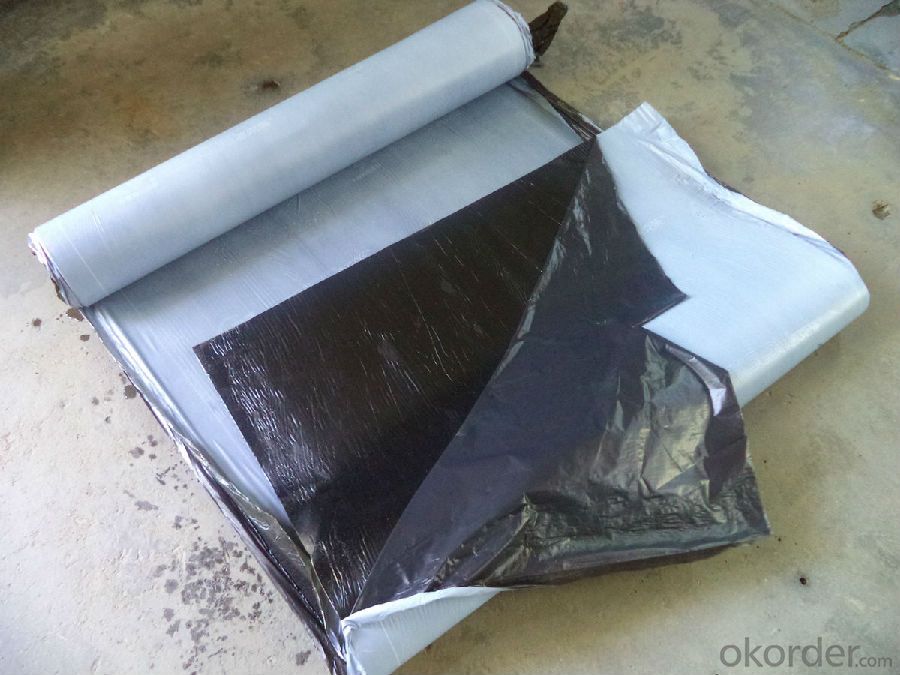
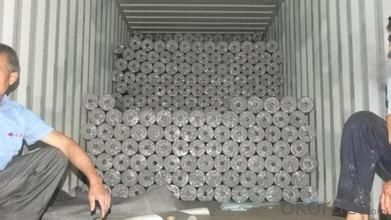
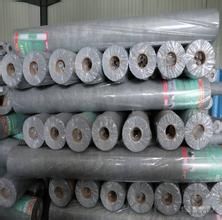
- Q: Can a waterproofing membrane be used on precast brick block surfaces?
- Yes, a waterproofing membrane can be used on precast brick block surfaces. The membrane acts as a barrier to prevent water penetration and can help protect the precast brick blocks from moisture damage.
- Q: Can a waterproofing membrane be used for seawalls or bulkheads?
- Seawalls or bulkheads can benefit from the use of a waterproofing membrane. These membranes are specifically designed to create a barrier against water, and they can be applied to various structures, including seawalls and bulkheads. The materials used for these membranes, such as bitumen, rubber, PVC, or polyurethane, are known for their excellent resistance to water and their ability to maintain the integrity of the wall or bulkhead. By applying the membrane to the surface of the structure, a continuous and durable waterproof layer is formed, effectively preventing water from seeping through. This protective layer helps safeguard the seawall or bulkhead from erosion, corrosion, and other types of damage caused by exposure to seawater. Moreover, waterproofing membranes offer additional advantages, including increased durability, improved aesthetics, and enhanced resistance to UV rays and chemicals. In conclusion, the use of a waterproofing membrane is a reliable solution for ensuring the long-term performance and durability of seawalls and bulkheads in marine environments.
- Q: Are waterproofing membranes suitable for balconies and terraces?
- Yes, waterproofing membranes are suitable for balconies and terraces. These membranes are specifically designed to provide a protective barrier against water and moisture, preventing any potential damage to the structure of the balcony or terrace. Waterproofing membranes are typically made of materials such as rubber, bitumen, or PVC, which are highly resistant to water penetration. They are applied as a liquid, sheet, or spray, creating a seamless layer that covers the entire surface of the balcony or terrace. This ensures that no water can seep through and cause any structural issues, such as cracks, leaks, or deterioration. Additionally, waterproofing membranes can also protect against other forms of damage, such as mold growth or corrosion. Overall, using waterproofing membranes on balconies and terraces is an effective and recommended solution for maintaining their longevity and structural integrity.
- Q: Can a waterproofing membrane be used in rooftop gardens or green roofs?
- Rooftop gardens or green roofs can benefit greatly from the utilization of a waterproofing membrane. It is, in fact, imperative to establish a dependable waterproofing system to safeguard the underlying structure against water-related harm. Acting as a hindrance, the waterproofing membrane effectively prevents any infiltration of water into the edifice or potential structural complications. Typically, this membrane is positioned beneath the soil or growth medium of the rooftop garden or green roof, guaranteeing adequate drainage and upholding the building's structural integrity. Furthermore, these membranes are specifically designed to endure exposure to UV rays, temperature fluctuations, and root intrusion, rendering them suitable for prolonged application in rooftop gardens or green roofs.
- Q: Can a waterproofing membrane be used for residential swimming pools?
- Yes, a waterproofing membrane can be used for residential swimming pools. These membranes are specifically designed to provide a water-resistant barrier, preventing leakage and protecting the structure of the pool. Waterproofing membranes are commonly used in various applications, including swimming pools, to ensure durability and longevity of the pool.
- Q: How does a waterproofing membrane handle exposure to chemicals or solvents?
- A waterproofing membrane is designed to be resistant to chemicals and solvents, allowing it to handle exposure without being damaged or deteriorated.
- Q: Can waterproofing membranes be used on mechanical rooms?
- Indeed, mechanical rooms can benefit from the application of waterproofing membranes. Within these rooms, one can frequently find water-sensitive equipment like boilers, pumps, and ventilation systems. By installing waterproofing membranes, it is possible to establish a safeguarding shield against water infiltration, thus averting any leaks, moisture accumulation, or potential harm to the equipment. Moreover, these membranes also possess the ability to offer thermal insulation, noise reduction, and fire resistance attributes. Therefore, it becomes crucial to select the suitable waterproofing membrane type that aligns with the distinct necessities and prerequisites of the mechanical room.
- Q: Can a waterproofing membrane be used for a restaurant?
- Yes, a waterproofing membrane can be used for a restaurant. A waterproofing membrane is a protective layer that is applied to surfaces to prevent water penetration. In a restaurant setting, where there is a significant amount of water usage in areas such as kitchens, dishwashing areas, and bathrooms, a waterproofing membrane can be beneficial in preventing water damage and moisture-related issues. It can be applied to walls, floors, and ceilings to create a barrier against water, ensuring the longevity and durability of the restaurant's infrastructure. Additionally, a waterproofing membrane can help maintain a clean and hygienic environment by preventing the growth of mold and mildew, which can be harmful to both the structure and the health of the occupants.
- Q: Can a waterproofing membrane be used for a plaza deck waterproofing?
- Yes, a waterproofing membrane can be used for plaza deck waterproofing. Waterproofing membranes are specifically designed to provide protection against water intrusion, making them an ideal choice for plaza deck waterproofing applications. These membranes are durable, flexible, and can effectively prevent water damage to the underlying structure.
- Q: Can a waterproofing membrane be certified or approved by industry organizations?
- Yes, a waterproofing membrane can be certified or approved by industry organizations. There are various industry organizations and standards bodies that evaluate and certify building materials and products, including waterproofing membranes. These certifications or approvals ensure that the membrane meets specific quality and performance standards set by the industry. Industry organizations such as the International Organization for Standardization (ISO), Underwriters Laboratories (UL), and the American Society for Testing and Materials (ASTM) often provide certifications or approvals for waterproofing membranes. These certifications involve rigorous testing and evaluation of the membrane's physical properties, such as its ability to resist water penetration, durability, and compatibility with other building materials. Certifications or approvals from industry organizations provide assurance to consumers, architects, contractors, and building owners that the waterproofing membrane has undergone testing and meets recognized standards for quality and performance. They also help in building code compliance and may be required for certain projects. It is always advisable to look for waterproofing membranes that have been certified or approved by reputable industry organizations to ensure that you are using a reliable and effective product for your waterproofing needs.
Send your message to us
Self adhensive Modified Waterproof Membrance for Roof
- Loading Port:
- Tianjin
- Payment Terms:
- TT or LC
- Min Order Qty:
- 5000 m²
- Supply Capability:
- 15000000 m²/month
OKorder Service Pledge
OKorder Financial Service
Similar products
Hot products
Hot Searches
Related keywords
